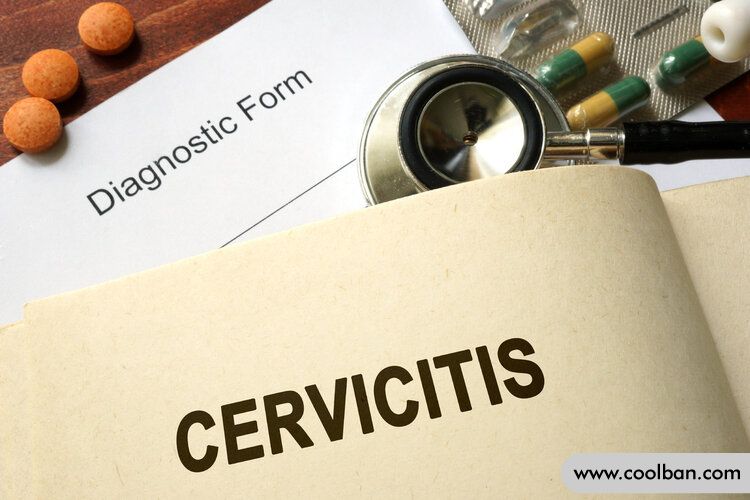Symptoms and prevention of cervicitis in women
2022-06-17
Ms. Huang and her husband had to live separate lives due to work reasons. Under the epidemic, it was not easy for the two to meet. During the Dragon Boat Festival just past, Ms. Huang came to her husband's city, and she was newly married, and the two had frequent sex after meeting.
But within a few days, Ms. Huang felt discomfort in her body, her leucorrhea increased with some bloodshots, and her genitals also had symptoms of itching. Seeing that the symptoms did not ease, she came to the hospital for examination and found that it was cervicitis caused by too frequent intercourse.

Is cervicitis because of too frequent "marital life"?
Cervicitis is a common female disease, mostly caused by exogenous infection. About 80% of married women suffer from cervicitis of varying degrees , especially in women of childbearing age , older women may also occur.
Some women also have symptoms of cervicitis after frequent intercourse. In fact, frequent intercourse among women is indeed one of the causes of cervicitis. Because of the excessively frequent marital life, women will be in a state of congestion in their private parts for a long time , which will easily lead to damage to the vaginal mucosa of women and a decrease in resistance.
Coupled with the continuous stimulation of the female cervical epithelium, it is easy to cause female symptoms such as cervicitis and vaginitis. In addition to frequent sex, a single sex life for too long can easily lead to prolonged pelvic congestion , bacteria can easily invade the body and cause gynecological symptoms.
These five are also the causes of cervicitis
In addition to excessive sexual activity, there are other factors that may also trigger cervical symptoms:
Frequent acceptance Gynecological surgery
Frequent abortions, childbirth , and women undergoing gynecological surgery are likely to damage the cervix, thereby reducing the resistance, and bacteria can easily enter and cause infection symptoms.
For example, abortion surgery will directly contact the cervix. The more women perform abortions, the greater the damage to the cervix, which will increase the chance of cervical symptoms. In addition, frequent labor and spontaneous abortion will also bring certain damage to the cervix and cervical tissue.

Drug abuse
Drugs not only easily damage the kidneys and liver, but also affect the endocrine system. For example, Abuse of contraceptives will increase estrogen and progesterone in women, which will stimulate the cervix;
If a large number of antibiotics are used in a short period of time , the flora environment in the vagina will be disturbed, and viruses and bacteria will take the opportunity to invade and multiply, resulting in the occurrence of cervicitis.
Excessive cleaning of the vulva
Many women attach great importance to the cleaning of their private parts. They usually use high-concentration nursing solution to clean their private parts. In fact, this can easily make the flora in the vagina unbalanced, create opportunities for bacterial invasion, and may also cause damage to the cervical tissue. cause cervicitis.
In addition, some care solutions are alkaline, which can easily destroy the original acidic environment in the vagina, and also easily lead to the occurrence of cervical symptoms.
Infected by Microbial infection
The more common ones are Escherichia coli, Staphylococcus, Streptococcus, Chlamydia trachomatis, Neisseria gonorrhoeae, Pseudomonas aeruginosa, etc. Women infected by these microorganisms are prone to purulent symptoms;
Trichomonas and viruses may also cause acute cervical symptoms; Mycobacterium tuberculosis easily causes tuberculous cervicitis. In addition, actinomycetes, viruses, amoeba, etc. may also induce cervical symptoms.
Foreign body in the vagina
If foreign objects such as gauze or cotton balls are placed in the vagina of women for a long time , infection is also likely to occur, resulting in the occurrence of acute cervicitis.

What are the symptoms of cervicitis?
Many women have the experience of suffering from gynecological diseases, but there are many types of gynecological diseases. How can we judge whether we have cervicitis according to the symptoms? The following symptoms are common symptoms of cervicitis:
Leucorrhea Increase
Patients with cervicitis will have obvious symptoms of increased leucorrhea, and the state of leucorrhea is relatively viscous , if it is a serious condition, it may also appear Purulent mucus or with a small amount of bloodshot , Some patients will experience vaginal bleeding, discomfort and other symptoms after intercourse.
Vulva Itching
Patients with cervicitis are prone to induce genital itching under the stimulation of secretions.
Pain
Patients with cervicitis also have obvious pain and discomfort, such as lower abdominal pain, frequent pain in the lumbosacral region , etc., especially during menstruation, sex, and defecation.
Frequent urination
Because the bladder is so close to the cervix, if the cervix is inflamed, the inflammation can affect the bladder through the lymphatic system.
The common manifestation is that when there is some urine in the bladder, there will be an urge to urinate, which is prone to symptoms of frequent urination, especially when sleeping at night, because the cervix is pressed on the bladder, it is more likely to cause frequent urination at night.
Extended reading: Will cervicitis develop into cervical cancer?
Many people worry that untreated cervicitis will develop into cervical cancer. In fact, most cervicitis is just chronic inflammation , while cervical cancer is related to long-term persistent infection with high-risk HPV subtypes , and cervical cancer and there is no direct connection, so cervicitis does not directly lead to cancer.

However, it is worth noting that if the cervix is inflamed, it is easy to cause damage to the cervical mucosa. At this time, it is easy to create an opportunity for the HPV virus to invade the female body, and may also remain in the basal cells of the cervix.
Once the immunity of the infected person declines, it is easy to form persistent HPV infection and cause lesions, and even induce cervical cancer, especially high-risk HPV is the culprit of cervical cancer.
If you want to prevent cervicitis, you should avoid wearing tight underwear and sitting for a long time, and pay attention to the hygiene of your private parts; after gynecological surgery, you should pay attention to preventing infection and do not have sex; do not use lotion frequently to clean your private parts, and do not overdo it. clean.
In addition, it is best for women to do regular gynecological examinations, and if they find cervical damage and lesions, they should be dealt with in time.
But within a few days, Ms. Huang felt discomfort in her body, her leucorrhea increased with some bloodshots, and her genitals also had symptoms of itching. Seeing that the symptoms did not ease, she came to the hospital for examination and found that it was cervicitis caused by too frequent intercourse.

Is cervicitis because of too frequent "marital life"?
Cervicitis is a common female disease, mostly caused by exogenous infection. About 80% of married women suffer from cervicitis of varying degrees , especially in women of childbearing age , older women may also occur.
Some women also have symptoms of cervicitis after frequent intercourse. In fact, frequent intercourse among women is indeed one of the causes of cervicitis. Because of the excessively frequent marital life, women will be in a state of congestion in their private parts for a long time , which will easily lead to damage to the vaginal mucosa of women and a decrease in resistance.
Coupled with the continuous stimulation of the female cervical epithelium, it is easy to cause female symptoms such as cervicitis and vaginitis. In addition to frequent sex, a single sex life for too long can easily lead to prolonged pelvic congestion , bacteria can easily invade the body and cause gynecological symptoms.
These five are also the causes of cervicitis
In addition to excessive sexual activity, there are other factors that may also trigger cervical symptoms:
Frequent acceptance Gynecological surgery
Frequent abortions, childbirth , and women undergoing gynecological surgery are likely to damage the cervix, thereby reducing the resistance, and bacteria can easily enter and cause infection symptoms.
For example, abortion surgery will directly contact the cervix. The more women perform abortions, the greater the damage to the cervix, which will increase the chance of cervical symptoms. In addition, frequent labor and spontaneous abortion will also bring certain damage to the cervix and cervical tissue.

Drug abuse
Drugs not only easily damage the kidneys and liver, but also affect the endocrine system. For example, Abuse of contraceptives will increase estrogen and progesterone in women, which will stimulate the cervix;
If a large number of antibiotics are used in a short period of time , the flora environment in the vagina will be disturbed, and viruses and bacteria will take the opportunity to invade and multiply, resulting in the occurrence of cervicitis.
Excessive cleaning of the vulva
Many women attach great importance to the cleaning of their private parts. They usually use high-concentration nursing solution to clean their private parts. In fact, this can easily make the flora in the vagina unbalanced, create opportunities for bacterial invasion, and may also cause damage to the cervical tissue. cause cervicitis.
In addition, some care solutions are alkaline, which can easily destroy the original acidic environment in the vagina, and also easily lead to the occurrence of cervical symptoms.
Infected by Microbial infection
The more common ones are Escherichia coli, Staphylococcus, Streptococcus, Chlamydia trachomatis, Neisseria gonorrhoeae, Pseudomonas aeruginosa, etc. Women infected by these microorganisms are prone to purulent symptoms;
Trichomonas and viruses may also cause acute cervical symptoms; Mycobacterium tuberculosis easily causes tuberculous cervicitis. In addition, actinomycetes, viruses, amoeba, etc. may also induce cervical symptoms.
Foreign body in the vagina
If foreign objects such as gauze or cotton balls are placed in the vagina of women for a long time , infection is also likely to occur, resulting in the occurrence of acute cervicitis.

What are the symptoms of cervicitis?
Many women have the experience of suffering from gynecological diseases, but there are many types of gynecological diseases. How can we judge whether we have cervicitis according to the symptoms? The following symptoms are common symptoms of cervicitis:
Leucorrhea Increase
Patients with cervicitis will have obvious symptoms of increased leucorrhea, and the state of leucorrhea is relatively viscous , if it is a serious condition, it may also appear Purulent mucus or with a small amount of bloodshot , Some patients will experience vaginal bleeding, discomfort and other symptoms after intercourse.
Vulva Itching
Patients with cervicitis are prone to induce genital itching under the stimulation of secretions.
Pain
Patients with cervicitis also have obvious pain and discomfort, such as lower abdominal pain, frequent pain in the lumbosacral region , etc., especially during menstruation, sex, and defecation.
Frequent urination
Because the bladder is so close to the cervix, if the cervix is inflamed, the inflammation can affect the bladder through the lymphatic system.
The common manifestation is that when there is some urine in the bladder, there will be an urge to urinate, which is prone to symptoms of frequent urination, especially when sleeping at night, because the cervix is pressed on the bladder, it is more likely to cause frequent urination at night.
Extended reading: Will cervicitis develop into cervical cancer?
Many people worry that untreated cervicitis will develop into cervical cancer. In fact, most cervicitis is just chronic inflammation , while cervical cancer is related to long-term persistent infection with high-risk HPV subtypes , and cervical cancer and there is no direct connection, so cervicitis does not directly lead to cancer.

However, it is worth noting that if the cervix is inflamed, it is easy to cause damage to the cervical mucosa. At this time, it is easy to create an opportunity for the HPV virus to invade the female body, and may also remain in the basal cells of the cervix.
Once the immunity of the infected person declines, it is easy to form persistent HPV infection and cause lesions, and even induce cervical cancer, especially high-risk HPV is the culprit of cervical cancer.
If you want to prevent cervicitis, you should avoid wearing tight underwear and sitting for a long time, and pay attention to the hygiene of your private parts; after gynecological surgery, you should pay attention to preventing infection and do not have sex; do not use lotion frequently to clean your private parts, and do not overdo it. clean.
In addition, it is best for women to do regular gynecological examinations, and if they find cervical damage and lesions, they should be dealt with in time.
